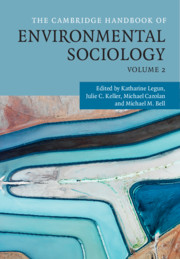Book contents
- The Cambridge Handbook of Environmental Sociology Volume 2
- The Cambridge Handbook of Environmental Sociology
- Copyright page
- Contents
- Figures
- Tables
- Contributors
- Foreword
- Introduction
- Part I Methods
- Part II Embodied Environmental Sociology
- Part III Beyond the Human
- Part IV Sustainability and Climate Change
- 12 Possibilities and Politics in Imagining Degrowth
- 13 Sustainable Consumption
- 14 Sustainability Cultures: Exploring the Relationships Between Cultural Attributes and Sustainability Outcomes
- 15 Socio-Ecological Sustainability and New Forms of Governance: Community Forestry and Citizen Involvement with Trees, Woods, and Forests
- 16 Carbon Markets and International Environmental Governance
- 17 The Multi-Level Governance Challenge of Climate Change in Brazil
- Part V Resources
- Part VI Food and Agriculture
- Part VII Social Movements
- Index
- References
15 - Socio-Ecological Sustainability and New Forms of Governance: Community Forestry and Citizen Involvement with Trees, Woods, and Forests
from Part IV - Sustainability and Climate Change
Published online by Cambridge University Press: 05 November 2020
- The Cambridge Handbook of Environmental Sociology Volume 2
- The Cambridge Handbook of Environmental Sociology
- Copyright page
- Contents
- Figures
- Tables
- Contributors
- Foreword
- Introduction
- Part I Methods
- Part II Embodied Environmental Sociology
- Part III Beyond the Human
- Part IV Sustainability and Climate Change
- 12 Possibilities and Politics in Imagining Degrowth
- 13 Sustainable Consumption
- 14 Sustainability Cultures: Exploring the Relationships Between Cultural Attributes and Sustainability Outcomes
- 15 Socio-Ecological Sustainability and New Forms of Governance: Community Forestry and Citizen Involvement with Trees, Woods, and Forests
- 16 Carbon Markets and International Environmental Governance
- 17 The Multi-Level Governance Challenge of Climate Change in Brazil
- Part V Resources
- Part VI Food and Agriculture
- Part VII Social Movements
- Index
- References
Summary
The last few decades have been dominated by policy and practice narratives which suggest that active and engaged citizens or communities with effective agency can make important contributions to the creation, management and protection of natural resources such as forests. Socio-ecological system perspectives also conceptualise governance as a situation where ‘the divide between those governing and those being governed’ is eliminated, and see a shift in conventional governance practice to adaptive governance as essential if forests are to cope with the Anthropocene. Adaptive governance relies on social innovation – the ability for citizens, communities and other stakeholders to engage in collective experimentation, learning and risk management, and finding governance solutions that focus on the social and ecological benefits contributing to resilience and sustainability of socio-ecological systems. Social innovation in community forestry in the UK shows combinations of practice that manage differing combinations of resources, forest functions and uses, and organisational arrangements that have the best potential for sustainability. Community self-mobilisation, and engagement with a constellation of actors, other community groups and networks, large organisations and the state, allows for local practices and ideas to be incorporated within existing institutions and to transform and develop in response to changing socio-ecological conditions.
- Type
- Chapter
- Information
- The Cambridge Handbook of Environmental Sociology , pp. 249 - 266Publisher: Cambridge University PressPrint publication year: 2020

